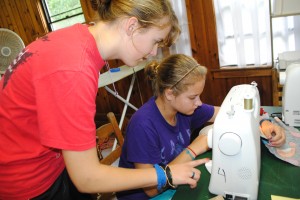How Your Teen is Wired
Posted by Phil Parents,
Parents,
Here are some tangible ideas to help you connect with your teen… Don’t try to make the conversation too serious. Enjoy this article from Focus on the Family by Joe White, Larry Weeden
Is your teen on the track to a meaningful future? Are you finding out what a joy it can be to help make the most of how God has wired him or her?
Many of us want to help our teens dream big, fulfilling, God-honoring dreams. But how do we do that?
The first step is to understand the great experiment known as your teen. In all of human history, there’s never been another person with your teen’s exact mix of God-given personality, talents, interests and spiritual gifts. As the two of you get to know that unique wiring through self-tests like the ones in the book Wired by God, you’ll start to see which kinds of dreams might make a good fit.
Your Teen’s Basic Bent
Here are some questions you can use anytime to find out how God has wired your young person:
- “What really drives you?”
- “What’s the most fun you’ve ever had helping someone else?”
- “What dreams do you think God has given you?”
- “What can you do that most people can’t?”
- “What ability would you most like to develop? Why?”
- “If God hired you for a summer job, what would you hope it would be? Why?”
And this one from Doug Fields, a youth pastor: “If you could design a specific way to serve God and knew you wouldn’t fail, what would you do?”
Remember that your purpose is to listen and learn, to better understand and appreciate your teen’s uniqueness. This is not the time for lectures and advice. Figuratively speaking, you need to have big ears and a small mouth, tough skin and a tender heart.
Another way to learn by questioning is to talk with others in your teen’s life: teachers, youth group leaders, coaches, school counselors, Scout leaders, Sunday school teachers, parents of close friends. Ask what they’ve observed about your child’s likes and dislikes, interests and passions, abilities and aptitudes.
Often these people will confirm your own observations. Sometimes, though, they’ll describe a side of your teen that you hadn’t noticed — or offer an insight you’d overlooked.
Your Teen’s Interests and Passions
Here’s a way to help your teen pinpoint his or her interests and natural abilities. It’s based on “The Vision Quest,” a tool developed by Tim Sanford, a counselor at Focus on the Family who works with a lot of young people.
Give your teen these instructions:
On a piece of paper, list the things you’ve done since the fourth grade. We’re talking about academics, sports, social events, the arts, student government, hobbies, interaction with family and friends, personal adventures, youth activities, socials, special events, camps, worship, leadership, volunteer work, mission trips, “helping out,” clubs, service projects, job duties, volunteer or assigned tasks, and chores.
You don’t have to compile your whole list at once. Allow two or three weeks, adding to it as new memories come to mind. If you don’t know whether to include something in the list, go ahead and put it down anyway.
Now give each activity a “positive” or a “negative” rating. How did it turn out? How did it affect you?
After several days, pull your worksheet out and think again about the events to which you gave a negative value. Look for patterns. For example, if events connected with mechanical things (fixing the car, building something, helping with props at the school play) consistently ended in disaster, you’re probably not the mechanical type.
Now move to the positive side of the worksheet. Ask yourself the questions below as you look over those events.
- “Is there a pattern or anything these events have in common?”
- “Are some of the activities things I’d like to pursue more?”
- “How can I begin doing more of these kinds of activities?”
- “What kinds of qualities, talents, character traits and skills do these activities require?”
- “Do I have some of those qualities and traits?”
- “Are any circumstances or events missing from my worksheet? If so, what are they, and why might they be missing?”
- “Are there any activities I’ve never done before, but I’d like to try?”
Posted in Just For Parents | Tagged Camp Crestridge, Camp Ridgecrest, Focus on the Family, parenting, Ridgecrest Summer Camps | Leave a reply
Conversation Starters: Make No Excuses
Posted by Phil Jeremiah 1:4-14,17-19
Jeremiah 1:4-14,17-19
no excuses for when God calls
Conversation Starters
How can you keep this conversation going at home? Try bouncing some of these questions around at the dinner table, as you’re driving your kids to school or an activity, or even while you’re shopping together:
For Preschoolers
God made you. What are some of the good things about you?
What are some of the things you see and hear that God made?
How can God use you to help someone else
For School-Age
What are some of your strengths, the things you do well?
How might God use those strengths?
What do you do when you don’t feel like you can do something well?
What are ways you see God use people’s weaknesses?
For Students
What does it mean to be called by God?
What are some ways God uses believers to serve Him and others even with their weaknesses?
Have you ever sensed God calling you to do something or to serve in some way? How did you respond?
What do you think is the biggest excuse people give for not following God’s call?
Posted in Just For Parents | Tagged 17-19, Camp Crestridge, Camp Ridgecrest, Jeremiah 1:4-14, Ridgecrest Summer Camps | Leave a reply
Conversation Starters: Confident
Posted by Phil Romans 8:14-17; 2 Corinthians 5:1-5; Ephesians 1:13-14
Romans 8:14-17; 2 Corinthians 5:1-5; Ephesians 1:13-14
Holy Spirit gives us confidence we are right with God
Conversation Starters
Parents, how can you keep this conversation going at home? Try bouncing some of these questions around at the dinner table, as you’re driving your kids to school or an activity, or even while you’re shopping together:
For Preschoolers
Ask: What makes you feel safe? Discuss the idea of safety and security. Remind your preschooler that God loves them and has promised to keep them safe. Spend a few minutes praying and thanking God for the safety we know we have in Him.
For Children
Ask: Who are some people you trust? What makes those people trustworthy? Discuss the characteristics your child included in his or her list. Discuss how many of those characteristics he or she believes God demonstrates. Highlight the fact that we can trust God and have confidence in the promises He makes.
For Students
Ask: What are some things you believe will happen in your future? (Examples: graduate high school, go to college, get married, have children, find a good job, and so forth) Why are you confident that those things will be a part of your future? Discuss responses. Using today’s focal passages, challenge students to determine why we can be confident of God’s work in our lives and His promises for our future.
Posted in Just For Parents | Tagged Camp Crestridge, Camp Ridgecrest, Conversation Starters, Romans 8:14-17; 2 Corinthians 5:1-5; Ephesians 1:13-14 | Leave a reply
“How To Get More Than A Grunt”
Posted by Sharon Have you ever picked up your child from camp and asked, “So how was it?” What kind of response did you receive? Did they go into detail about the activities, their counselors, their cabinmates, the food they ate? I’m sure you have also experienced this during the school year when you ask a question and the only response you receive is, “fine”.
Have you ever picked up your child from camp and asked, “So how was it?” What kind of response did you receive? Did they go into detail about the activities, their counselors, their cabinmates, the food they ate? I’m sure you have also experienced this during the school year when you ask a question and the only response you receive is, “fine”.
I came across an article recently by Paul Robertson called, “How to get more than a grunt”. When I was growing up, this was me. My parents were the last people I wanted to talk to about what was going on. Even though they tried hard, I didn’t give them the response they hoped for.
The principles in this article can be applied to camp. When the campers get picked up on Closing Day, they are feeling all sorts of emotions. They’re happy to see their family and friends at home and to actually be at home. But they’re also sad to leave their friends at camp and the environment at camp. During the ride home, they may be excited to give highlights. But what about the deeper things? It is important to know that it may take time for your child to process the things they learned at camp, whether it was how to set the table or learning about the relationship they can have with Christ. If you ask a question on the ride home or the day after and they respond with a short sentence, give them more time to process and let those new experiences settle in. Here are some questions you can ask throughout the following weeks after your child comes home:
Tell me about your counselors.
What was your favorite activity?
What was the Theme this summer? Tell me about it.
Who do you want to keep in touch with?
What was the hardest challenge?
Tell me about something you accomplished while at camp.
Tell me about your camping trips.
What skills did you take? What did you learn in those skills?
By asking questions like this, you will able to get an accurate picture of what your child experienced at camp. If you have any questions you’d like to add, please do so in the comment section below.
Sharon Aylestock
Assistant Director, Camp Crestridge
Posted in Just For Parents | Tagged Camp Crestridge, Camp Ridgecrest, CPYU, Experience, Questions, Ridgecrest Summer Camps, Summer | Leave a reply
Building Self-Esteem in Your Kids
Posted by Phil Camp Parents,
Camp Parents,
As you continue to figure to how to parent your kids, we hope that these words of wisdom from Focus on the Family can help…
This clever discipline method is less exhausting and more successful than ranting, raving, blaming, pleading, begging or threatening.
by Shana Schutte
When kids are small, they learn the ABCs. They’re happy to sing them in the bathtub, in the car and while they’re eating their Cheerios. But according to Dr. Leman, the ABCs are for parents, too — ABCs that build a healthy self-esteem in your child.
According to Leman, author of Have a New Kid by Friday, a healthy self-esteem is cultivated in children through Acceptance, Belonging and Competence.
Acceptance
Some parents who are turned-off by their child’s choice of music or clothes send a message to their kids that not only is their child’s behavior unacceptable, but that they are unacceptable. As a result, their child spends hours listening to their iPod, playing computer games or talking on the phone. Why? Because if a child doesn’t feel accepted by their parents, they’ll look for acceptance from their friends. However, when parents unconditionally accept their kids, they will be much less likely to seek acceptance from a peer group — and they will develop a healthier self-esteem. According to Dr. Leman, “Your unconditional acceptance of your child means everything in her development.”
If you want to send a strong message to your child that he is accepted, listen and ask questions to show you care about his interests and concerns. In short, develop a relationship with your kids. Dr. Leman says, “Without a relationship, your rules, your words and your actions mean nothing. The wedge between you and your children will drive them toward Acceptance and Belonging in a group outside your home.”
Belonging
Everyone, whether they are five or fifty, wants to belong. Many people go to great lengths to ensure that they are connected with someone who cares. How can you give your kids a sense of belonging? By creating a community within your family. To accomplish this, Dr. Leman suggests giving your children a vote in decisions, listening to what they say and supporting them in their activities.
In Have a New Kid by Friday, Dr. Leman tells a story about 15-year-old Melissa who was approached and offered a cigarette. Because she had a strong sense of belonging within her family, she didn’t need the cigarette and replied, “No thanks. We Crayburns don’t smoke.”
By creating a healthy self-esteem, a sense of belonging helps your child resist peer pressure and creates a set of expectations for your kids to attain. For Melissa, it was the expectation that her family doesn’t smoke.
Competence
The third way to build self-esteem in your kids is to give them the gift of competence. Children become competent when they experience life first hand. If you are an overprotective parent, you’ll need to fight the urge to do for your kids what they can do for themselves.
In his book, Dr. Leman writes:
“These days, parents are overly concerned with their child’s self-esteem. ‘I want Johnny to feel good about himself,’ a mother says. So what does a mother do? She goes out of her way to clear life’s roads for her child, to do things for him that he should be doing for himself.
She thinks she’s helping him with his self-esteem, but what she is she really doing? She’s sending a negative message: ‘I think you’re so stupid that you can’t do it yourself, so I’ll do it for you.'”
The way a mother eagle teaches her eaglets to fly is an excellent example of how guiding (without over-controlling) helps kids mature and develop healthy self-esteem.
When a mother eagle wants her baby to fly, she waits until her eaglet is 80% of his adult size. Then she sets him on the edge of the nest and pushes him off into the wild blue. She watches her baby bird freefall, then swoops down just in time to catch him on her wings. This exercise is repeated over and over until the baby eaglet learns to fly.
By doing this, her baby’s confidence (and self-esteem, if eagles had such a thing) grows. Imagine if she was overly protective. Her eaglet would never learn to fly; he’d never mature.
In the same way, kids mature and develop a healthy self-esteem by experiencing life first hand, even if it means that sometimes they make mistakes.
When I was 19, I decided to move to London, England for a semester. My mom must have worried about me, but she never let on. London, with 13 million people, was light years away from my small town in southern Idaho. Even though I know Mom was concerned, she was very supportive. She has said in response to that adventure (and many others that I have embarked on), “You have to raise your kids to be independent. Some people want to keep their kids under their wing. That’s not the goal; the goal is to raise responsible adults.” And responsible adults are made by giving kids the gift of competence. Dr. Leman would be proud Mom.
Of course, your little person will not be traveling independently overseas anytime soon, but as he exerts his independence, ask yourself if what you want to protect your children from is necessary. If it’s not a life or death situation (or harmful), allowing your child to make mistakes will help develop his self-esteem.
There you have it: the ABCs of building self-esteem in your kids. Granted, it may not be as easy as singing the song, but with a little practice, your kids can grow up to become confident and responsible adults.
Posted in Just For Parents | Tagged Camp Crestridge, Camp Ridgecrest, Focus on the Family, parent articles, Ridgecrest Summer Camps | Leave a reply
Good Advice
Posted by Phil My church is going through some “aging” pains… sometimes I feel like I’m one of the “young people” at the church, and at the age of 56, that’s not a good thing! Our church has a lot of older folks, and then, surprisingly, a good sized youth group. That’s because our youth pastor has made a concerted effort to reach out to young people in the community, engage them in their faith, and get them plugged into our church community. For most of them, it is sad that their parents don’t come as well. Yet the teenagers continue to come, despite the lack of modeling by the parents.
My church is going through some “aging” pains… sometimes I feel like I’m one of the “young people” at the church, and at the age of 56, that’s not a good thing! Our church has a lot of older folks, and then, surprisingly, a good sized youth group. That’s because our youth pastor has made a concerted effort to reach out to young people in the community, engage them in their faith, and get them plugged into our church community. For most of them, it is sad that their parents don’t come as well. Yet the teenagers continue to come, despite the lack of modeling by the parents.
While church by itself is not the point, it seems clear that God has chosen to use the local church to consistently draw both children and parents to His side.
I am thankful that I had parents that made me go to church, and they went as well. There were many Sundays during my childhood that I wanted to stay home and watch cartoons, or sleep late, or do anything but go to church. But our family was consistently there every Sunday, and it was a priority in our family. Because of that modeling by my parents, I went to church enough to learn about a Savior that changed my life!
If your family has made it a priority to be in church on Sunday mornings, then God bless you, and I’m sure he does! If your family is like so many families today that try to get to church every now and then, then I would encourage you to consider making church going a priority in the life of your family. Parenting, and raising children is a daunting challenge if faced alone. We pray that your family would find a community of believers that wants to pursue our God together… Proverbs 22:6 says “Train up a child in the way he should go; even when he is old he will not depart from it.” Good advice… God bless!
Ron Springs
Camps Director
Posted in Just For Parents | Tagged Camp Ridgecrest, Just for Parents, parent resourses, parenting, Parenting Teenagers, Ridgecrest Summer Camps, Ron Springs | Leave a reply
The Wonders of Reality Discipline
Posted by PhilEnjoy this excellent article from Focus on the Family…
This clever discipline method is less exhausting and more successful than ranting, raving, blaming, pleading, begging or threatening.
I once read a newspaper headline that made me chuckle: “Red Lipstick Empowers Women.” The caption, coupled with a photo of Marilyn Monroe wearing a white flowing dress and painted crimson lips, made me think that perhaps I’d found the answer to the discipline problems with my elementary students. That’s been my problem all along — I’ve been wearing champagne pink!
Wouldn’t it be wonderful if changing lipstick was all it took to become more effective and empowered in handling discipline problems with children?
While child psychologist Dr. Kevin Leman is an out-of-the-box parenting problem solver who might buy into the lipstick method if it worked, Dr. Leman instead teaches parents about the effective “Reality Discipline.” This clever method of getting little “ankle biters” to obey is less exhausting and more successful than ranting, raving, blaming, pleading, begging or threatening.
It’s all about responsibility
The first thing to remember about Reality Discipline is that you want your children to learn to think for themselves and learn to become more responsible through guidance and action-oriented techniques. In an article from First Things First, Dr. Leman says, “Action-oriented discipline is based on the reality that there are times when you have to pull the rug out and let the little buzzards tumble. I mean disciplining your children in such a way that he/she accepts responsibility and learns accountability for his actions.” Here’s an example.
When my brother was in high school, my mother implemented Reality Discipline without realizing it. My little brother, Gannon, could sleep through a tornado (or a hurricane or tsunami) and my mother was tired of waking him up every morning and saying, “You’d better hurry, or you’re going to miss the bus.” Finally, Mom thought, I’m not waking him up anymore. He can be late. Just as she suspected, Gannon did miss the bus and was forced to walk the mile to school. Much to my mother’s delight, he was never late again. She didn’t have to beg, plead, give him ultimatums or nag Gannon one more time. Instead, she let reality do the discipline.
A little bit of ice cream can do the trick
One afternoon, I had the privilege of listening to Dr. Leman explain on the radio how reality discipline teaches responsibility. He told an engaging story about a mother whose preschool son was driving her bananas because every day when she stopped to pick him up from preschool, he ran from her on the playground. She felt like a fool for being outrun by a preschooler while teachers and parents looked on. Desperate, she asked Dr. Leman for advice.
Dr. Leman suggested that if her son ran from her next time, she should ask another adult on the playground if they would be kind enough to keep an eye on her son for a few minutes. Then she should drive away, go to the nearest ice cream shop, purchase a cone for herself and drive back to the school to pick up her son. Then, when her little guy got in the car and asked, “Where’s my ice cream?” he told the woman she should cheerfully say, “Well you could have had some ice cream, but you ran away; so I had to go get some alone.”
One point for mom; zero for Junior. That’s Reality Discipline. No ranting. No raving. No warnings. Just cool, collected action with some quick, clever thinking to make your point loud and clear.
Sounds great, right? Here are some basic principles of Reality Discipline to help you get (and keep) the upper hand with your kids.
Don’t focus on creating a happy child
In his book Have a New Kid by Friday, Dr. Leman says that the goal of parenting is not to create happy kids; rather, it’s to create responsible kids. This means Junior will probably be pretty unhappy that he didn’t get an ice cream cone; he may even throw a fit, and rant and rave — but he will become more responsible and respectful. Don’t back down, but do stay cool as a cucumber. Remind yourself that it’s a battle of the wits and the wills, and you will win.
Understand your child’s reality
According to Dr Leman, if you want to use Reality Discipline effectively, you need to know what’s important to your child — what really moves him in his reality. Your child may value money, sports, a daily cookie break, staying up late or spending time with friends. Parents who know how to use Reality Discipline make creative connections between bad behavior and discipline through action rather than through warnings, nagging or threats.
For example, suppose you ask your ten-year-old daughter (who loves saving money) to take out the trash. She ignores you, and thirty minutes later the trash is still sitting by the back door. With a little creativity, you decide to implement some Reality Discipline. Instead of reminding your daughter about the trash, you enlist her younger sister to take it out . Then you take some money out of your ten-year-old daughter’s allowance and give it to her sister for a job well done. Can you imagine the peace and satisfaction that could come from being such a quick-witted parent?
Note: If you want to use Reality Discipline, you have to listen to your child. Then you’ll know what will move him to responsibility. The more you understand what’s important to him, the more ammunition you’ll have in your arsenal to “train up” your child in the way he should go.
Make sure that Reality Discipline is grounded in love
In Have a New Kid by Friday, Dr. Leman writes, “Show me a mean teacher, and I’ll show you a good one.” If you find that you are a permissive parent who is afraid of “pulling the rug out from under your child” as Dr. Leman suggests, remember that Reality Discipline is not unkind. Instead, when it’s motivated by love to help your child mature into a responsible adult, it’s a very good gift.
Posted in Just For Parents | Tagged Camp Crestridge, Camp Ridgecrest, Focus on the Family, parent articles, Ridgecrest Summer Camps | Leave a reply
Conversation Starter: Victorious
Posted by Phil Romans 7:20–8:9
Romans 7:20–8:9
Holy Spirit helps us live victoriously over sin
Conversation Starters
How can you keep this conversation going at home? Try bouncing some of these questions around at the dinner table, as you’re driving your kids to school or an activity, or even while you’re shopping together:
For Preschool
What is your favorite game to play with your friends? How do they help you win the game?
For Children
What are some things you like doing with other people? What makes that so special? How do you see God helping you make good choices about right and wrong? How can you lead your friends toward making wise choices?
For Students
Who is someone you think never struggles with internal battles with sin? Why? How does knowing Paul struggled with that conflict make you feel? How does knowing the Spirit can help you experience victory over sin make you feel?
Posted in Just For Parents | Tagged Camp Crestridge, Camp Ridgecrest, Conversation Starters, parent resources, Ridgercest Summer Camps, Romans 7:20–8:9 | Leave a reply
Beating Cabin Fever with Kids
Posted by Phil To the tune of “Home on the Range”: Home, home another day; the skies are cloudy and gray; the kids will not sit, there are no more craft kits, and the wind is too whipping to play. When the first winter school cancellation keeps you home, you thank God for the downtime. After several weeks of overcast days, boredom hits. Try some simple activities to get off the couch and make memories.
To the tune of “Home on the Range”: Home, home another day; the skies are cloudy and gray; the kids will not sit, there are no more craft kits, and the wind is too whipping to play. When the first winter school cancellation keeps you home, you thank God for the downtime. After several weeks of overcast days, boredom hits. Try some simple activities to get off the couch and make memories.
- Get out puppets or costumes and act out favorite Bible stories or children’s books.
- Learn a new board game or play an old favorite.
- Work on a puzzle together. Use a card table so you won’t have to put the work-in-progress away prematurely.
- Read a family novel. Mom or Dad can read one or several chapters every time a school day or event is cancelled. Be sure to pull out blankets and make popcorn to make reading time something to look forward to.
- Make exercise flash cards together. Draw stick figures and write words indicating which exercise to do, such as five sit-ups or 10 jumping jacks. Play with the cards in different ways throughout winter – hide them around the room and find them or let someone draw which ones to do.
- Work on a handcrafted item together, such as sewing a baby quilt, crocheting a scarf, or assembling a birdhouse.
- Create an age-friendly scavenger hunt (indoors or outdoors).
- Learn a new song together as a family – von Trapp style!
- Have “brain blizzards.” See who can think of the most crazy uses for winter gear, such as boots, snow shovels, or even snow.
- Make snow angels. If you live where there is no snow, purchase instant snow at an educational store and have fun experimenting with it.
When life gives you lemons
Winter months are citrus season. Watch for specials on oranges, lemons, grapefruit, and limes.
- Make fresh lemonade.
- Make a citrus salad. Teach your child how to peel, separate, and slice the fruit and stir 3 to 4 cups of several kinds together with ½ cup of sour cream and ½ cup of whipped topping.
- Slice citrus in half. Make prints by dipping the sliced fruit face into fingerpaint and pressing it onto paper.
- Have a smelling and tasting contest – blindfolded!
This article is courtesy of ParentLife magazine.
by Kristen White on Thursday, December 29, 2011
Posted in Just For Parents | Tagged Camp Crestridge, camp parent, Camp Ridgecrest, Ridgecrest Summer Camps, snow days | Leave a reply
Conversation Starter: Free
Posted by Phil Living Beyond Yourself
Living Beyond Yourself
John 16:5-15
Holy Spirit points us to our need for Christ and how we can receive Him
Conversation Starters
How can you keep this conversation going at home? Try bouncing some of these questions around at the dinner table, as you’re driving your kids to school or an activity, or even while you’re shopping together:
For Preschoolers
This week, spend some time talking with your preschooler about what makes God special. Emphasize things like “God loves you,” “God gives us what we need,” “God protects us,” and so forth.
For Children
What kinds of freedoms do we enjoy in our country? What sacrifices did people have to make so we could have those freedoms? How are these freedoms similar or different from the freedom God provided when Jesus died on the cross?
For Students
Why do we spend so much time trying to be free? When have really felt like you were really free?
If you had to describe the Holy Spirit to a friend, what would you say?
What is the hardest thing for you to understand about the Trinity?
Posted in Just For Parents | Tagged Camp Crestridge, Camp Parents, Camp Ridgecrest, Conversation Starters, John 16:5-15, Just for Parents, Ridgecrest Summer Camps | Leave a reply
